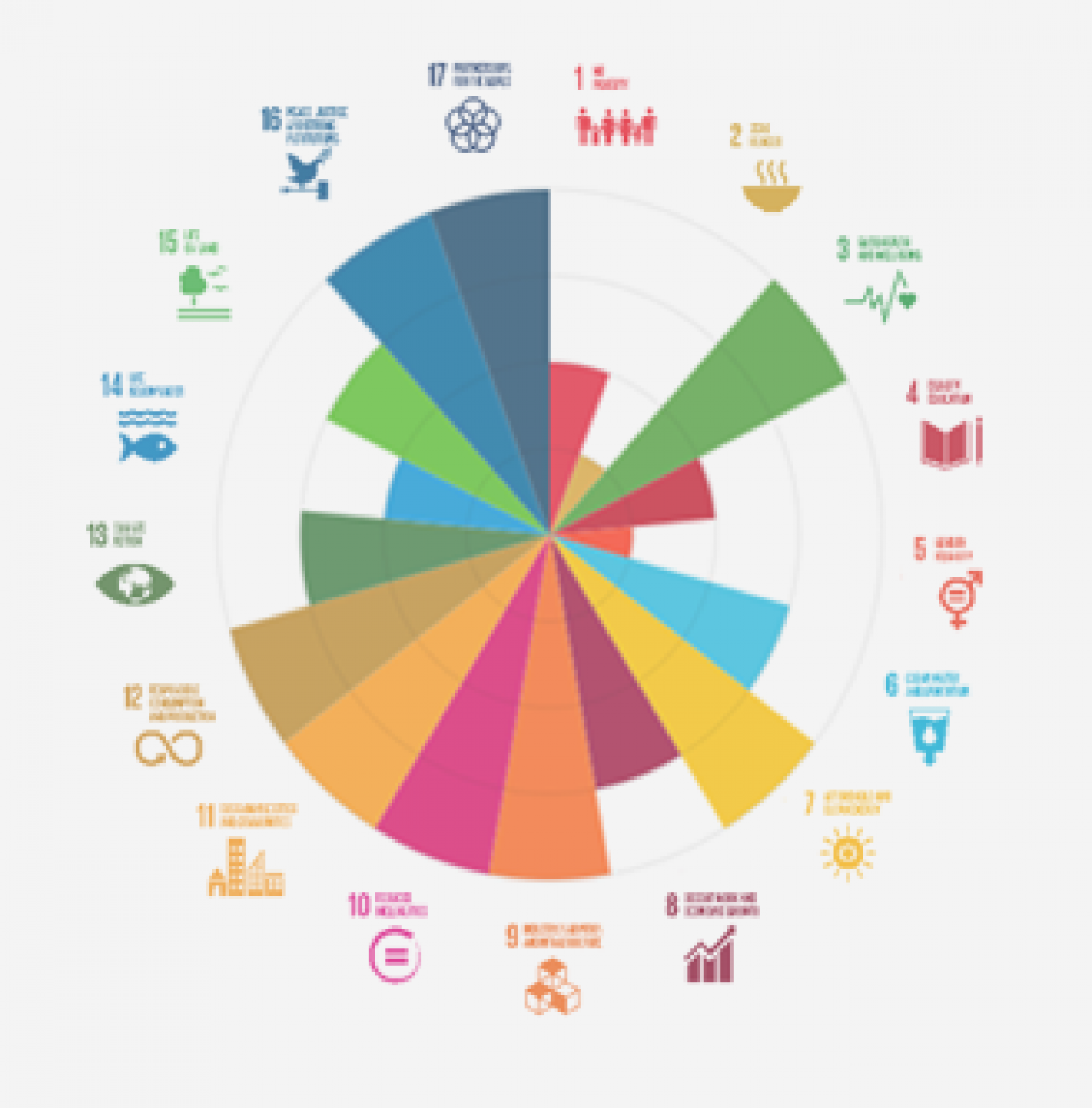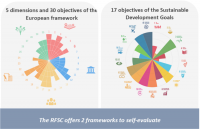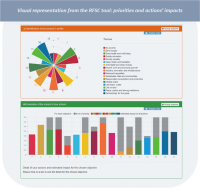
In the course of the life of the Global Goals for Cities (GG4C) network, the 19 city partners used an existing self-assessment tool: the RFSC, or Reference Framework for Sustainable Cities. Based on European principles for sustainable and integrated urban development, the tool available online was used during the diagnosis and visioning phase of the network (as an analytical tool), and partners will use it again in the planning phase (as a planning tool). What is the RFSC? And what did it bring to the network?
What is the RFSC?
The RFSC is a user-friendly online self-assessment tool that helps cities to analyse, design, implement and monitor integrated sustainable urban development strategies and/or projects. Cities can review and assess their priorities in light of European and Global frameworks, and develop set of actions and a monitoring system linked with the objectives of integrated and sustainable urban development.
Originating from the Leipzig Charter of 2007, the RFSC promotes European principles for sustainable and integrated development in the five dimensions of urban development, which leads to an assessment of urban development policies or projects towards 30 objectives:
- The Spatial dimension, which related to urban planning and land use to promote high quality public spaces, spatial equity, territorial resilience and sustainable mobility
- The Governance dimension, to ensure a sound and integrated city management to increase citizen participation and partnership for capacitybuilding (strategically, financially, democratically)
- The Social dimension, which includes social aspects of urban development such as social inclusion, intergenerational equity, safe and affordable housing, education and culture opportunities
- The Economic dimension to foster connectivity and sustainable production and consumption, as part of a circular economic system built on green growth and smart cities
- The Environmental dimension guarantee that urban development will neither go against the mitigation and adaptation needed to climate change, nor compromise natural resources such as water, air, and natural areas.
The RFSC online has, since then, included other frameworks for self-assessments, such as the 17 SDGs. Because it evolves and is flexible, the RFSC continues to be relevant with regard to the new Leipzig Charter and complementary to the global and European agendas, such as the Urban Agenda for the EU and the SDGs.
The SDGs provide a common and global framework to think through and develop integrated and sustainable local actions that respond to local issues, while contributing to global development goals. It was natural for the RFSC tool online to evolve in 2015, to adapt and to allow its user to self-assess also against the 17 SDGs.

How was it used? What did it provide?
An analytical tool during the baseline assessment
As part of the activities conducted by the network, the 19 partners conducted self-assessments of their local policies and actions using the RFSC, during the diagnosis phase of the network. They evaluated the local policies or policy environment: mainly through the first 2 steps proposed by the tool: 1) a prioritisation exercise of the goals according to their local objectives and context; and 2) an assessment of the impacts of local actions in light of the 17 global objectives.
This exercise highlighted the differences and commonalities between the 19 city partners, when it comes to the relevance and links between the SDGs and their local priorities. If all SDGs are key to sustainable development in general, cities and local governments are not omniscient, and can only act according to their given mandates. Therefore, the exercise showed that the SDG11 (on sustainable cities and communities) was of very high importance to all city partners, along with the SDGs related to “Prosperity”, namely SDGs 7, 8, 9, 10. Given the recent global developments and concerns, it is not surprising that objectives related to economic and employment opportunities for all local residents are prioritised by cities. Cities highlighted their need to plan for a sustainable recovery from the Covid-19 pandemic while taking advantage of new funding opportunities from the EU.
A conversation starter to prioritise local actions across departments and with actors
The graphical representations provided by the tool were used within cities, within and across departments and with local stakeholders (gathered at the occasion of this network under the name: URBACT Local Group). By using the illustration generated by the RFSC, partners of the network had a simple visual support from a macro-perspective to engage conversation with colleagues and stakeholders on local actions and activities, without losing sight of the bigger picture.
Given that a self-assessment is as robust as the number of persons involved in its fulfilment, using the RFSC at the on-set of the network’s life allowed a variety of stakeholders to discuss and exchange on the municipalities’ objectives and strategic policies. The outcomes of the self-assessments at local levels were challenged and discussed further, as the activities advanced in the network.
As the meetings and conversation progressed, the RFSC tool helped partner cities to move the conversation on the sustainability of overall municipal priorities and strategies to the relevance of current and evolving projects and activities implemented at local level with regards to the SDGs. The self-assessments revealed a variety of perspectives, arguments and sometimes points of disagreement on current local actions, but gave an overall guide to frame these conversations. This led to the identification of gaps in current policy objectives, and helped (re)defined in light of the global objectives (the SDGs), existing and future actions to be implemented at local level.

An evolving tool for sustainable urban development
The RFSC is an ever-evolving tool, which can always be improved (nothing and none is perfect). The 19 partner cities have already shared ideas to improve the tool online further, with, for instance:
- additional feature to be able to define further and visualise their “localisation of the SDGs” (to make the SDGs targets relevant to local government level of action and contexts)
- further guidance on actions’ impact measurement (this is left to users to agree on a methodology at this point, but guidance or potential methodologies could be offered in the tool)
- the possibility to search for “sustainable actions” and examples from other cities using the RFSC.
Stay tuned, as this feedback received will be put in action, and new features will be developed in the tool: www.rfsc.eu
